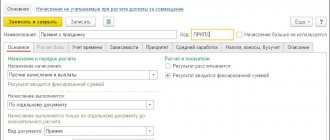Incentive payments (bonuses) as a form of payment for work
The current labor legislation (Article 129 of the Labor Code of the Russian Federation) allows the employer to establish a wage system consisting of several parts:
- payments for work performed in accordance with job duties;
- compensatory payments taking into account the conditions in which work is carried out;
- additional incentive payments designed to increase employee interest in work.
By adopting such a remuneration system, the employer has the opportunity to:
- influence the employee’s interest in the results of his activities;
- regulate the amount of labor costs taken into account when calculating the income tax base.
The types of bonuses and remunerations used as additional incentive payments are reflected in the internal regulations developed by the employer (Article 135 of the Labor Code of the Russian Federation). This act establishes:
- list of types of incentives used;
- conditions and frequency of their accrual;
- the circle of persons to whom each type of incentive applies;
- a list of indicators that allow an employee to qualify for appropriate remuneration and deprive him of such an opportunity;
- a system for assessing indicators giving the right to remuneration, the result of processing of which will be the monetary value of the remuneration;
- procedure for reviewing assessment results and challenging its results.
However, incentive additional payments, when included in the remuneration system, become mandatory for the employer if all conditions for applying the incentive are met.
For information on how an internal regulatory act on bonuses , read the article “Regulations on the remuneration of employees - sample 2020-2021”.
Decor
Any incentive measure must be documented. The registration procedure is prescribed in the local regulations of the enterprise - in the collective agreement, regulations on incentives, internal regulations, etc. The method of incentives, priority and basis for applying the measure are prescribed there.
After the decision on promotion is made, an order on promotion is drawn up. The basis for the order may be a report or official note or a proposal for promotion.
These documents are addressed to the head of the enterprise and contain a reasonable presentation of the idea, describe in detail the employee’s achievements, and an assessment of his work activity. It is used to reward a specific employee, indicating the type of incentive, its form and status.
Formally, the presentation of incentives is a type of memorandum.
The sequence of signatures depends on the specifics of the organization . In the case of financial incentives, there is a need for a visa from the accounting department. A HR signature may be required to confirm employee information.
Registration of employee incentives ultimately falls on the shoulders of the personnel officer. As a result, it is the personnel service that transmits the note to the manager to obtain his decision on this issue - agreement with the planned incentive measure, signature and date.
Are there any differences in the concepts of “monetary remuneration” and “wages”
The term "cash reward" can be applied to any payment made in money, regardless of its purpose. That is, it can be either remuneration for work or any other payment. Additional incentive payments made for the employee’s labor achievements are part of the salary and, when issued in cash, are regarded as monetary rewards issued as payment for labor.
But in addition to payments related to labor achievements, the employer can use other additional payments that are not determined by the employee’s labor functions. Usually they are one-time in nature and do not have a regular accrual period. An example of such additional payments are bonuses paid for anniversaries or holidays. They fully correspond to the term “monetary remuneration not related to wages.”
Commentary on Article 191 of the Labor Code of the Russian Federation
1. According to Part 1 of the commented article, the employer encourages employees who conscientiously perform their job duties.
It is considered conscientious to perform job duties in strict accordance with the requirements for the performance of work, in compliance with the rules and regulations established by job descriptions, qualification characteristics of work, instructions and requirements for labor protection and other documents regulating the performance of a job function by an employee, in compliance with the current in organizing internal labor regulations.
Encouragement is a special form of public recognition of the employee’s merits in connection with the success he has achieved in his work. It not only has a positive moral impact on the employee, but can also lead to the provision of certain benefits and benefits. According to established practice, incentives for the successful and conscientious performance of one’s job duties are taken into account when deciding on promotion or preferential right to remain at work when reducing the number or staff of the organization’s employees, etc.
Reward has a positive impact not only on the rewarded employee, but also on other employees, i.e. is a certain incentive to conscientiously fulfill the duties assigned to them and to observe labor discipline.
In accordance with Part 1 of the commented article, the employer has the right to apply the following incentives to the employee:
- express gratitude;
- issue a bonus;
- award with a valuable gift, certificate of honor;
- nominate for the title of the best in the profession.
2. The specified list of incentives is not exhaustive. The regulations or charter on discipline, collective agreement or internal labor regulations may determine other types of incentives (for example, awarding the title “veteran honored worker of the industry”).
Thus, in accordance with the Regulations on the discipline of railway transport workers of the Russian Federation, railway transport workers can be awarded the “Honorary Railway Worker” badge. The Charter on the discipline of workers of the fishing fleet of the Russian Federation provides for such type of incentive as entry into the Book of Honor, the Book of Ship History and the Board of Honor (see Decree of the Government of the Russian Federation of September 21, 2000 N 708).
An employer can apply several incentives to an employee at the same time. In practice, as a rule, they combine measures of moral and material incentives, for example, declaring gratitude and issuing a bonus. Unlike previous legislation, the Labor Code does not provide for rules on the non-application of incentive measures to an employee during the period of validity of a disciplinary sanction.
In order to ensure the transparency and effectiveness of incentives, they are announced by order and brought to the attention of all employees.
3. For special labor services to society and the state, i.e. For services whose significance extends beyond the boundaries of a specific organization, employees may be nominated for state awards.
State awards are the highest form of encouragement for citizens of the Russian Federation for services in the field of state building, economics, science, culture, art and education, in strengthening the rule of law, protecting health and life, protecting the rights and freedoms of citizens, education, development of sports, for significant contributions to the cause defense of the Fatherland and ensuring the security of the state, for active charitable activities and other services to the state.
Regulations on state awards of the Russian Federation, approved. Decree of the President of the Russian Federation dated September 7, 2010 N 1099 establishes the following types of state awards:
a) the highest ranks of the Russian Federation;
b) Order of the Russian Federation;
c) insignia of the Russian Federation;
d) medals of the Russian Federation;
e) honorary titles of the Russian Federation.
The highest titles of the Russian Federation are the title of Hero of the Russian Federation and the title of Hero of Labor of the Russian Federation.
The following orders of the Russian Federation have been established: Order of St. Apostle Andrew the First-Called; Order of St. George; Order "For Merit to the Fatherland"; Order of the Holy Great Martyr Catherine; Order of Alexander Nevsky; Order of Suvorov; Order of Ushakov; Order of Zhukov; Order of Kutuzov; Order of Nakhimov; Order of Courage; Order of Military Merit; Order "For Naval Merit"; Order of Honor; Order of Friendship; Order of "Parental Glory"
The insignia of the Russian Federation are: the insignia - the St. George's Cross, the insignia "For good deeds", the insignia "For impeccable service".
The following medals of the Russian Federation have been established: medal of the Order of Merit for the Fatherland; Medal of Honor"; Suvorov medal; Ushakov medal; Zhukov medal; Nesterov medal; Pushkin medal; medal “For saving the dead”; medal “For Excellence in the Protection of Public Order”; medal “For Distinction in the Protection of the State Border”; medal “For works in agriculture”; medal "For the development of railways"; medal “For merits in space exploration; Medal of the Order of Parental Glory.
61 honorary titles of the Russian Federation have been established, including: “Pilot-Cosmonaut of the Russian Federation; "People's Artist of the Russian Federation"; "People's Architect of the Russian Federation"; "People's Teacher of the Russian Federation"; "People's Artist of the Russian Federation"; "Honored Artist of the Russian Federation"; "Honored Architect of the Russian Federation"; "Honored Artist of the Russian Federation"; "Honored Scientist of the Russian Federation"; “Honored Lawyer of the Russian Federation”, etc.
In accordance with the said Decree of the President of the Russian Federation, jubilee medals of the Russian Federation, awards established by federal government bodies and other federal government bodies, government bodies of constituent entities of the Russian Federation, public and religious associations are not considered state awards.
When presented for state awards, the type of award is determined by the nature and degree of merit of the recipient, which must comply with the statutes of orders of the Russian Federation, provisions on insignia of the Russian Federation, medals of the Russian Federation and honorary titles of the Russian Federation.
A petition for a state award is initiated at the place of main (permanent) work of the person nominated for the state award:
a) teams of organizations;
b) state bodies or local government bodies.
The decision to award a state award is made by the President of the Russian Federation on the basis of a proposal submitted to the President of the Russian Federation and a proposal from the Commission under the President of the Russian Federation for State Awards.
State awards are presented by the President of the Russian Federation.
On behalf of the President of the Russian Federation and on his behalf, state awards may be presented to:
a) Chairman of the Government of the Russian Federation;
b) members of the Government of the Russian Federation, heads of federal government bodies and other federal government bodies;
c) officials of the Administration of the President of the Russian Federation;
d) senior officials of the constituent entities of the Russian Federation;
e) heads of diplomatic missions and consular offices of the Russian Federation;
f) presidents of state academies of sciences;
g) commanders of military units, formations, commanders of associations, as well as other officials determined by the head of the relevant federal executive body in which military service is provided.
The President of the Russian Federation may entrust the presentation of state awards to other persons.
State awards and documents for them are presented to the recipients in a solemn ceremony no later than three months from the date of entry into force of the decree of the President of the Russian Federation on the award.
4. Types of awards for special labor merits also include state awards, prizes, certificates of honor and gratitude from the Government of the Russian Federation. They are awarded for achievements in the field of literature and art, science and technology, and in the field of education.
Federal Law No. 80-FZ of May 19, 1995 established the annual State Prize of the Russian Federation named after Marshal of the Soviet Union G.K. Zhukov for outstanding achievements in the field of military science and the creation of military equipment, as well as for the best works of literature and art dedicated to the Great Patriotic War.
The amount, procedure for awarding and presenting the State Prize are determined by the Regulations on the State Prize of the Russian Federation named after Marshal of the Soviet Union G.K. Zhukov, approved by Decree of the President of the Russian Federation of October 28, 1996 N 1499.
Decree of the President of the Russian Federation dated June 21, 2004 N 785 established four State Prizes of the Russian Federation in the field of science and technology and three State Prizes of the Russian Federation in the field of literature and art in the amount of 5 million rubles. each.
These prizes are awarded to citizens of the Russian Federation for their outstanding contribution to the development of domestic and world science and culture in order to stimulate further scientific and creative activities of the laureates of these prizes, creating favorable conditions for new scientific discoveries and creative achievements.
Decree of the Government of the Russian Federation dated January 31, 2009 N 73 provides for the awarding of the Certificate of Honor of the Government of the Russian Federation and the declaration of gratitude of the Government of the Russian Federation for services in promoting the implementation of social and economic policies of the state, the implementation of the effective activities of federal government bodies, the development of local self-government, ensuring the rule of law, the rights and freedoms of citizens, strengthening the country's defense capability and state security, implementing the state's foreign policy, as well as exercising other powers vested in the Government of the Russian Federation by the Constitution of the Russian Federation, federal constitutional laws, federal laws, and decrees of the President of the Russian Federation.
Citizens of the Russian Federation, as a rule, who are widely known, can be awarded such certificates and thanks.
Petitions for awarding a certificate and declaring gratitude may be initiated by local government bodies and organizations. These petitions are sent to the relevant senior officials of the constituent entities of the Russian Federation (heads of the highest executive bodies of state power of the constituent entities of the Russian Federation) or heads of federal government bodies.
The aforementioned Decree of the Government of the Russian Federation approved the Regulations on the Certificate of Honor of the Government of the Russian Federation and gratitude of the Government of the Russian Federation.
The Veterans Law provides for the title “labor veteran.” The procedure and conditions for conferring the title “labor veteran” are determined by the laws and other regulatory legal acts of the constituent entities of the Russian Federation.
Information about awards and incentives for labor merits is entered into the workers’ work books. According to clause 24 of the Rules for maintaining and storing work books, producing work book forms and providing employers with them, the following information is entered into work books:
- on awarding state awards, incl. on the conferment of state honorary titles on the basis of relevant decrees and other decisions;
- awarding certificates of honor, conferring titles and awarding badges, badges, diplomas, certificates of honor by employers;
- other types of incentives provided for by the legislation of the Russian Federation, as well as collective agreements, internal labor regulations, charters and regulations on discipline.
What kind of bonuses are there and how else can employee incentives be expressed?
Incentives that serve the purpose of stimulating employees are divided into 2 main types:
- material (monetary or in kind), representing various types of additional payments;
- intangible, which can be expressed in a declaration of gratitude, placement on the honor board, assignment of an honorary title, awarding a diploma, medal or memorial sign.
Among material incentives, the leading role is given to bonuses. But there may also be other types of cash payments, expressed, for example:
- in bonuses to the salary or tariff rate established for a certain period;
- additional payments for length of service.
Among bonuses in relation to the regularity of their payment, there are 2 main groups:
- Regular (systematic), accrued and paid at a certain frequency (month, quarter, year). All issues related to such bonuses are regulated by the employer’s internal regulations on incentive payments. Special instructions (decisions) for calculating such bonuses are not needed. If the conditions stipulated by the internal regulations on bonuses are met, they must be accrued without fail.
- Irregular (one-time), which can be named in the internal regulatory act on bonuses as included in the remuneration system, but their accrual requires additional information on indicators essential for bonuses. Therefore, for such bonuses it is necessary to draw up a separate document justifying the employee’s right to receive a bonus, and to make a separate decision on this document by the head of the organization.
According to the sources through which bonuses are calculated, they can be divided:
- included in expenses that reduce the income tax base - this will include bonuses related to the employee’s labor achievements, both included in the remuneration system and not included in this system;
- attributable to net profit - such attribution applies to bonuses for non-production purposes, paid not for labor achievements (letter of the Ministry of Finance of Russia dated April 24, 2013 No. 03-03-06/1/14283).
For information about what bonuses are included in the calculation of average earnings, read the material “Are bonuses taken into account when calculating vacation pay?”
Types of incentives
Types of employee incentives , as noted earlier, are conventionally divided into tangible and intangible benefits. This list is added by one more type - this is legal.
However, material incentives are not always money; they can also be of an unusual nature. For example, the best employee of the month is awarded a certificate from a store selling office furniture, and can choose the most comfortable chair as a bonus, or the company will pay for a vacation in warm countries, etc.
As for moral encouragement, these are not always certificates and letters of gratitude. For example, a good employee may be awarded the title “best in his profession” or “best specialist.”
Legal types of incentives include certain relaxations of labor regulations. For example, an employee may be late for work once or take an extra day off.
Various types of incentives depend on the specifics of the enterprise where the employee works. If this is a banking institution, then they may offer him a loan on preferential terms, and if it is an internal affairs agency, then, for example, he may be given a personalized weapon.
The types of bonuses can be considered in the table:
| Indicators subject to bonuses | Result | Type of promotion |
| Suggestions for improving the quality of work | Approved by the manager | Certificate of honor, placement of a photo on the stand, depending on the degree of importance of the work |
| Not approved | Verbal thanks | |
| An original approach to solving the problem | Approved | Written gratitude, certificate |
| Not approved | Verbal thanks | |
| Completing assigned tasks with a result of 200% | Approved | Payment of remuneration in the amount of double salary |
What are the differences between a bonus and a bonus, a regular bonus and a guaranteed one?
With regard to the words “premium” and “bonus”, dictionaries of financial terms give very similar interpretations, implying the same concept - “remuneration”. Therefore they can be considered identical. Although some nuances of the explanations given in the dictionaries allow us to consider the bonus as an unexpected payment (a gift), which makes it closer in meaning to irregular (one-time) bonuses.
Regular types of bonuses to employees include bonuses included in the remuneration system (i.e., which have become mandatory for the employer), accrued and paid at specified intervals. In certain circumstances, they may not be accrued (for example, in the event of unsatisfactory financial and economic performance of the organization for the period or in relation to an employee deprived of a bonus in accordance with the bonus rules), but this turns out to be the exception rather than the rule.
Guaranteed bonuses should be considered those regular bonuses that are set in a fixed amount and do not depend either on the results of the employee’s work or on the time actually worked by him.
How is a bonus for a professional holiday or anniversary taxed in 2022?
Bonuses paid for labor achievements are regarded as payment for labor and, like regular salaries, are subject to personal income tax and insurance contributions.
But incentive payments not related to work achievements, such as an employee’s anniversary bonus or a holiday bonus, are also employee income. And they, just like wages, must be subject to personal income tax and insurance contributions (Article 420 of the Tax Code of the Russian Federation, paragraph 1 of Article 20.1 of the Law “On Compulsory Social Insurance against Accidents...” dated July 24, 1998 No. 125-FZ). Moreover, contributions, in contrast to the amount of such a premium itself, can be taken into account in expenses when determining the income tax base (subclause 49, paragraph 1, article 264 of the Tax Code of the Russian Federation, letter of the Ministry of Finance of Russia dated 06/09/2014 No. 03-03-06/1 /27634).
ConsultantPlus experts explained in detail how to reflect bonuses in form 6-NDFL. Get trial access to the K+ system and switch to the Ready-made solution for free
How to fill out an order if a company’s employees have been given a bonus (sample)
To issue an order for bonuses, there are unified forms approved by Resolution of the State Statistics Committee of the Russian Federation dated January 5, 2004 No. 1:
- T-11, issued when awarding bonuses to one employee;
- T-11a, compiled with the encouragement of a group of workers.
However, these forms are not mandatory for use and nothing prevents the employer from issuing such orders using a form developed independently.
The basis for issuing an order will be:
- the results of the distribution of regular (systematic) bonuses approved by the head of the organization;
- a memorandum with a positive resolution from the head of the organization regarding the nomination of an employee for an irregular (one-time) bonus.
A sample of filling out an order for bonuses, drawn up on form T-11, can be seen on our website.
Procedure for rewarding employees
The employer's decision on possible incentives for employees is reflected in the relevant document - Regulations on Bonuses.
This document is not mandatory. Its presence is advisory in nature. The document will make the incentive procedure transparent, which will save the employer from disputes and unnecessary explanations on the one hand, and will allow him to trust on the other hand.
The legislation does not have specific conditions for formalizing the provision. It refers to local acts of the enterprise and is published in any form.
The document must contain the following information:
- Availability of a mark indicating that the promotion procedure has been agreed upon with the trade union;
- Approved order of the manager;
- Availability of employee signatures indicating that they are aware of this provision;
- General conditions for receiving remuneration;
- Recipient criteria;
- Amount of payments;
- Periodicity;
- Conditions under which payments may be terminated or suspended.
Another nuance for the need to issue regulations on bonuses is that incentives are paid on a regular basis. For one-time awards, such a document is not required. The procedure and forms of incentives for employees based on recommendations are subject to agreement with the manager.
Results
One of the components of the remuneration system can be incentive payments.
The main role among these payments is given to bonuses. Bonuses can be regular or one-time, expensed and paid out of net profit. But they are taxed according to the same rules with the calculation of personal income tax and insurance contributions. Payment of the premium must be formalized by order. You can find more complete information on the topic in ConsultantPlus. Free trial access to the system for 2 days.
Features of using the premium system
A bonus is the most common material incentive for success at work. It acts as a powerful incentive for company employees and often has a positive effect on productivity and labor efficiency.
For an employer, developing a bonus system primarily means the ability to attract and retain highly qualified specialists.
Each company has its own system for calculating and paying bonuses that meets the individual characteristics of business activities. Its development and installation is carried out by the relevant department of the organization.
Bonuses are awarded in accordance with the following principles:
- The bonus must be assigned to a specific employee for a certain personal contribution to the company's activities.
- Incentives for work (bonuses) should not be included in wages. It is important that an employee of the organization knows how to distinguish between these payments.
- Determining the amount of incentive payments must have an economic justification.
- Bonuses should be paid for meeting certain conditions or achieving specific indicators.





